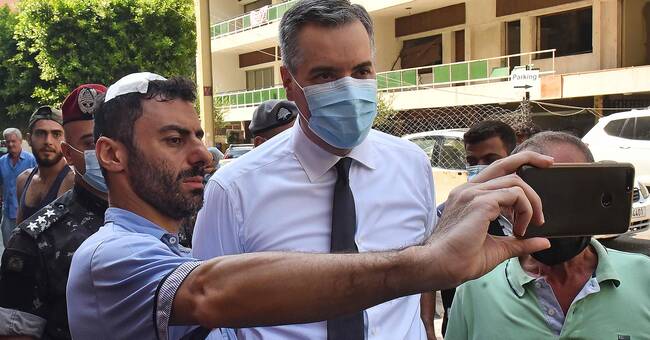Mustafa Adib has been serving as Lebanon's ambassador to Germany for eight years.
He has a degree in law and political science and has previously served as Chief of Staff to the former Prime Minister Najib Mikati.
The appointment of Adib has taken place under time pressure. It comes at the same time as French President Emmanuel Macron is coming to Beirut with demands for reforms and new elections in exchange for financial support.
According to information to the news agency Reuters, Macron is said to have been involved in pushing forward the agreement on Adib after the talks about a new prime minister got stuck last week.
Avoid change
But critics see Adib as part of the political establishment accused of decades of corruption and misrule in Lebanon - and see the nomination as a new attempt by Lebanon's leadership to avoid real change.
Almost a month after the explosion that devastated large parts of Beirut, killed 190 people and left a quarter of a million people homeless, Lebanon's political leadership has done little to help the survivors.
Javascript is disabled
Javascript must be turned on to play video
Read more about browser support
The browser is not supported
SVT does not support playback in your browser.
We therefore recommend that you switch to another browser.
Read more about browser support
See the pictures from Beirut's port area when the giant explosion occurs.
Photo: Reuters
The investigation that has been initiated has not asked a single minister or high-ranking official about how thousands of tonnes of highly explosive ammonium nitrate could be stored in the port in the heart of the city.
Instead, ruling politicians have done everything they can to cling to power.
Major popular protests
Lebanon's government divides power between the country's 18 different religious groups - a system accused of cementing decades of corruption and nepotism.
The country's political leadership consists in part of former warlords who wore suits at the end of the civil war 30 years ago and took their seats in parliament.
In October last year, huge popular protests against corruption led to the resignation of the then Prime Minister Saad al-Hariri.
The government that followed under Prime Minister Hassan Diab failed to implement the major political and economic reforms promised.
Demonstrations continued, and after the harbor explosion on August 4, anger boiled over.
Nevertheless, it took almost a week before Diab submitted its resignation.
Power is divided between religious groups
Lebanon has the world's largest proportion of refugees and a collapse would mean a potential migration crisis for Europe.
The Shia-Muslim Iranian-backed Hezbollah movement, which has been branded a terrorist by Germany and Britain, among others, has great influence in the country's parliament, while Hezbollah's armed militia is taking part in the war in Syria.
At the same time, Lebanon is a secular republic where power is distributed between the various religious groups.
The president will be a Christian Maronite, the Prime Minister a Sunni Muslim and the Speaker of the Shia Muslim parliament.
"Pray that we will succeed"
The economy is in free fall and the country's currency has lost 80 percent of its value in the past year.
In a speech ahead of Lebanon's centenary this weekend, President Michel Aoun emphasized the need for reforms to reduce the influence of religion on the country's politics.
He then promised to call for discussions with society's actors on how to go about it.
In his speech after he was appointed prime minister on Monday, Mustafa Adib promised to form a government in "record time".
He urged the reporters present to "pray that we succeed".
Immediately afterwards, he went to the area near the port of Beirut to meet residents affected by the explosion.
But the meeting was far from welcoming, and his security personnel quickly had to push Adib into the car again while people around him chanted "revolution".

